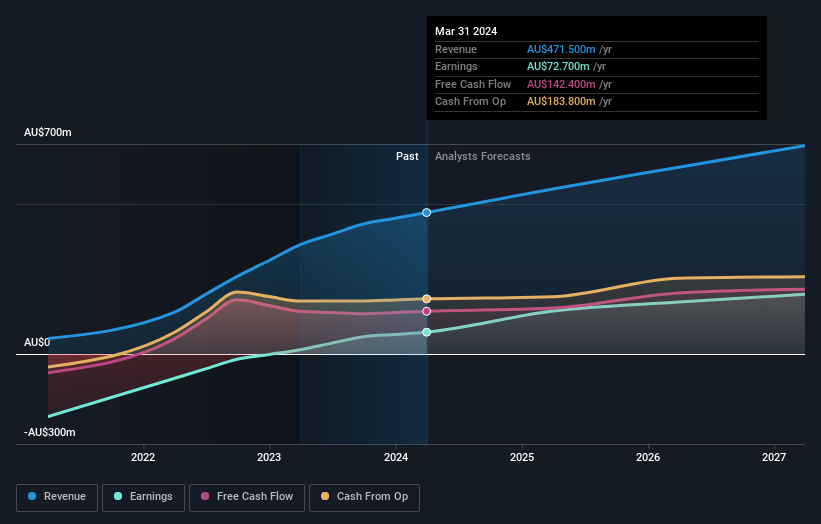- Australia
- /
- Hospitality
- /
- ASX:WEB
Webjet Limited (ASX:WEB) most popular amongst retail investors who own 54% of the shares, institutions hold 41%

Key Insights
- Webjet's significant retail investors ownership suggests that the key decisions are influenced by shareholders from the larger public
- 45% of the business is held by the top 25 shareholders
- Institutional ownership in Webjet is 41%
If you want to know who really controls Webjet Limited (ASX:WEB), then you'll have to look at the makeup of its share registry. And the group that holds the biggest piece of the pie are retail investors with 54% ownership. Put another way, the group faces the maximum upside potential (or downside risk).
And institutions on the other hand have a 41% ownership in the company. Insiders often own a large chunk of younger, smaller, companies while huge companies tend to have institutions as shareholders.
Let's delve deeper into each type of owner of Webjet, beginning with the chart below.
Check out our latest analysis for Webjet

What Does The Institutional Ownership Tell Us About Webjet?
Many institutions measure their performance against an index that approximates the local market. So they usually pay more attention to companies that are included in major indices.
As you can see, institutional investors have a fair amount of stake in Webjet. This can indicate that the company has a certain degree of credibility in the investment community. However, it is best to be wary of relying on the supposed validation that comes with institutional investors. They too, get it wrong sometimes. If multiple institutions change their view on a stock at the same time, you could see the share price drop fast. It's therefore worth looking at Webjet's earnings history below. Of course, the future is what really matters.

Hedge funds don't have many shares in Webjet. First Sentier Investors (Australia) IM Ltd is currently the company's largest shareholder with 9.1% of shares outstanding. Meanwhile, the second and third largest shareholders, hold 5.7% and 5.6%, of the shares outstanding, respectively. Additionally, the company's CEO John Guscic directly holds 2.0% of the total shares outstanding.
A deeper look at our ownership data shows that the top 25 shareholders collectively hold less than half of the register, suggesting a large group of small holders where no single shareholder has a majority.
Researching institutional ownership is a good way to gauge and filter a stock's expected performance. The same can be achieved by studying analyst sentiments. There are plenty of analysts covering the stock, so it might be worth seeing what they are forecasting, too.
Insider Ownership Of Webjet
The definition of company insiders can be subjective and does vary between jurisdictions. Our data reflects individual insiders, capturing board members at the very least. Company management run the business, but the CEO will answer to the board, even if he or she is a member of it.
Insider ownership is positive when it signals leadership are thinking like the true owners of the company. However, high insider ownership can also give immense power to a small group within the company. This can be negative in some circumstances.
We can see that insiders own shares in Webjet Limited. The insiders have a meaningful stake worth AU$138m. Most would see this as a real positive. Most would say this shows alignment of interests between shareholders and the board. Still, it might be worth checking if those insiders have been selling.
General Public Ownership
The general public, mostly comprising of individual investors, collectively holds 54% of Webjet shares. This size of ownership gives investors from the general public some collective power. They can and probably do influence decisions on executive compensation, dividend policies and proposed business acquisitions.
Next Steps:
While it is well worth considering the different groups that own a company, there are other factors that are even more important. Case in point: We've spotted 1 warning sign for Webjet you should be aware of.
But ultimately it is the future, not the past, that will determine how well the owners of this business will do. Therefore we think it advisable to take a look at this free report showing whether analysts are predicting a brighter future.
NB: Figures in this article are calculated using data from the last twelve months, which refer to the 12-month period ending on the last date of the month the financial statement is dated. This may not be consistent with full year annual report figures.
Valuation is complex, but we're here to simplify it.
Discover if Web Travel Group might be undervalued or overvalued with our detailed analysis, featuring fair value estimates, potential risks, dividends, insider trades, and its financial condition.
Access Free AnalysisHave feedback on this article? Concerned about the content? Get in touch with us directly. Alternatively, email editorial-team (at) simplywallst.com.
This article by Simply Wall St is general in nature. We provide commentary based on historical data and analyst forecasts only using an unbiased methodology and our articles are not intended to be financial advice. It does not constitute a recommendation to buy or sell any stock, and does not take account of your objectives, or your financial situation. We aim to bring you long-term focused analysis driven by fundamental data. Note that our analysis may not factor in the latest price-sensitive company announcements or qualitative material. Simply Wall St has no position in any stocks mentioned.
About ASX:WEB
Web Travel Group
Provides online travel booking services in Australia, New Zealand, the United Arab Emirates, the United Kingdom, and internationally.
Solid track record with excellent balance sheet.


